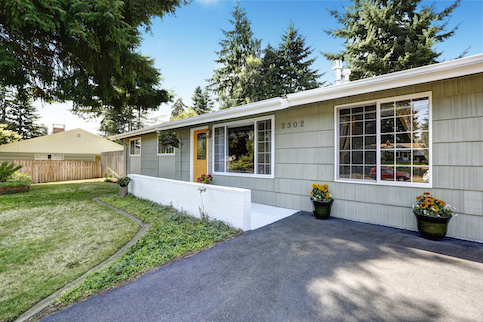How To Buy A House In A Seller’s Market: A Complete Guide

Struggling to find your dream home in your dream neighborhood? You might be fighting against a seller’s market, a real estate market in which the number of homes for sale is not high enough to meet the demand from potential buyers.
When you’re trying to buy in a seller’s market, you’ll struggle to negotiate lower prices from sellers. Owners don’t have to budge much on their asking prices when so many buyers are fighting for a lower number of homes. Some owners might even receive multiple offers on their homes at or above asking price, making it even less likely that they will negotiate down.
You’ll also need to act quickly: Homes sell fast in a seller’s market. If you hesitate to make an offer, another buyer might snatch the home you were considering.
This doesn’t mean that it’s impossible to buy a home at a fair price in a seller’s market. You just need to come prepared to act quickly. It helps, too, to get preapproved for financing from a mortgage lender before you start hunting for homes.
Here are some tips for successfully buying a home in a seller’s market.
The Challenges Of A Seller’s Market
In a seller’s market, homeowners have the advantage during price negotiations. If sellers think a buyer’s offer is too low, they can insist on a higher price. If the buyer isn’t willing to pay, the sellers can simply wait for another offer. If you’re in a market where the supply of homes is lower than the demand for them, the odds are high that new buyers will make higher offers, and sellers can just wait for their desired price.
To compete in a seller’s market, buyers often must make an offer that is equal to or even higher than the asking price requested by owners. If a seller is listing a home for $300,000, you might have to make an offer for that full amount to land the home.
And if several buyers are bidding on the same home – something that isn’t unusual during a seller’s market – you might have to make an offer higher than the seller’s original asking price. For example, if a seller is asking for $310,000, you might have to make an offer for $320,000 to beat out other buyers.
But while it’s true that submitting the highest offer greatly increases your chances of landing a home in a seller’s market, what if you don’t want to overpay? Or what if you have budget limitations that prevent you from simply outbidding other buyers? There are steps you can take to make yourself a more attractive buyer and gain an edge over other house hunters without busting your budget.
See What You Qualify For
Home Purchase
Home Refinance
Tap Into Equity
How To Get A House In A Seller’s Market
While buying a home in a seller’s market is challenging, it’s not impossible. Here are some strategies to succeed in such a market:
1. Work With A REALTOR®
Your first step should be to work with a real estate agent, or REALTOR® who knows your market. They can tell you whether a home is priced fairly or if a seller is overpricing a property. They can also handle the negotiation process for you, helping you fight for the lowest possible sales price.
A real estate agent with connections might also get access to homes that haven’t yet hit the multiple listing service (MLS), meaning that you might be one of the first buyers to tour these properties. That will give you an advantage in a seller’s market. You might be able to make an offer before other buyers even see the home. Best of all? You won’t pay for your real estate agent’s services. The seller typically pays for your agent through the proceeds from his or her home sale.
2. Look For Below-Budget Homes
Winning a bidding war in a seller’s market might require you to submit an offer higher than the seller’s asking price. One way to do this without breaking your budget? Look for homes with prices that are under what you hoped to spend. That way, you can make an offer higher than the seller’s asking price without necessarily paying more than what you budgeted for your new home.
Say you are prepared to buy a home with a maximum price tag of $350,000. If you find a home that fits your needs and has a sales price of $290,000, you can make an offer above that – say, $310,000 – and still buy the home under your budget if the sellers accept your price.
You’ll increase the odds of landing the home because your offer, while still under your budget, is for a higher amount than what the sellers expected to nab.
3. Drop The Contingencies
It’s true that contingent offers can protect your interests when buying a home. But some contingencies can also make it more difficult to compete in a seller’s market.
A contingency is anything that must happen before your purchase of a home becomes final. For instance, you might make a contingent offer stating that your sale won’t close until you first sell your existing home. Another popular contingency? You might state that you won’t finalize the purchase of a home until after a home inspector tours the property.
You should never drop your inspection contingency. An inspection could turn up expensive surprises. Buying a home without one opens you up to financial pain.
But you might consider dropping some contingencies in a seller’s market. For instance, stating that you won’t finalize your purchase until you sell your existing home could cause you to lose out on your dream residence. Owners in a seller’s market might instead choose an offer that doesn’t come with such a contingency. To boost your odds of landing a home in a seller’s market, you might have to drop the home-sale contingency and buy a home whenever you’re fortunate enough to find one, even if you haven’t yet sold your current property.
4. Stay Patient, But Eager
Patience is key to working through a seller’s market. But patience doesn’t mean inaction. Waiting too long to make an offer could cost you the right home in the perfect neighborhood.
Well-priced properties in desirable neighborhoods often attract a bidding war during seller’s markets. This is when several potential buyers make offers on a single property. This means that if you find a home that you like, you might need to make an offer quickly. If you take days to think over whether a property is the right fit, you might find that its owners have already sold it while you’re debating whether to make an offer.
This doesn’t mean that you should rush to buy a home that you’re not in love with. If you’re not entirely convinced that a home is for you, don’t make an offer just to beat out other possible buyers. Be patient and wait for that right home.
Be sure to scour home listings on your local MLS, too. These online listings of homes for sale in your neighborhood give you the best opportunity to find homes quickly.
Check listings often. You never know when the right home for you will hit the market. But you do know that in a seller’s market, that home won’t stay for sale for long.
The Bottom Line: Craft Your Strategy To Win In A Seller’s Market
Buying a home in a seller’s market isn’t easy, but it isn’t impossible, either. The key is to craft a winning strategy, one that includes getting preapproved for a mortgage loan before you start looking at homes.
Get matched with a lender that will work for your financial situation.











